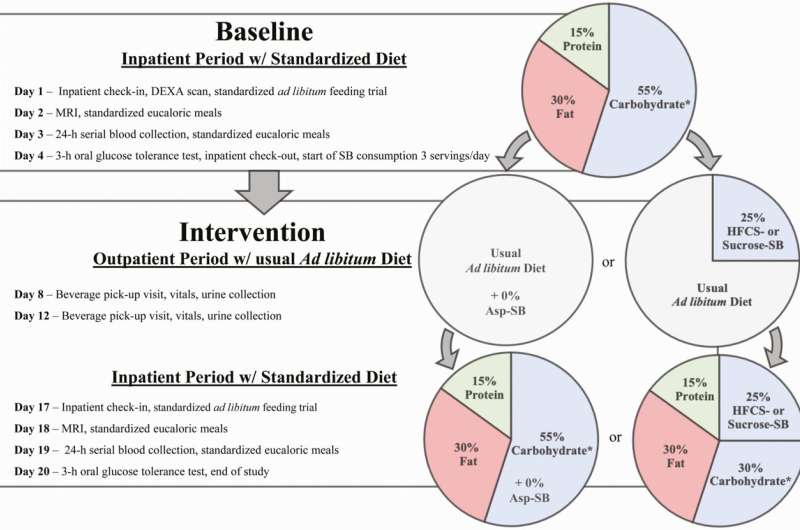Both sucrose and high fructose corn syrup linked to increased health risks

Consuming sucrose, the more "natural form of sugar," may be as bad for your health as consuming high fructose corn syrup, according to a University of California, Davis, study published in the Journal of Clinical Endocrinology and Metabolism.
"This is the first dietary intervention study to show that consumption of both sucrose- and high fructose corn-sweetened beverages increase liver fat and decrease insulin sensitivity," said Kimber Stanhope, a research nutrition biologist with the UC Davis School of Veterinary Medicine. "People often have a skewed perspective of aspartame and give sucrose a pass, but this study suggests that consumers should be equally concerned about both major added sugars in our food supply."
Participants (18 to 40 years old) were assigned to beverage groups matched for sex, body mass index, fasting triglyceride, lipoprotein and insulin concentrations. They drank three servings a day of either a sucrose-sweetened beverage, a high fructose corn-sweetened beverage, or an aspartame-sweetened beverage for 16 days.
The double-blind study was unique in that the 187 subjects lived in a clinical unit for 3.5 days before beverage consumption and during the final days of beverage consumption. Thus, their diet and activity levels were controlled prior to the assessments of risk factors that occurred before and after beverage consumption. This control helped the researchers document how quickly the study subjects, even those who were very lean or normal weight, showed changes in liver fat, insulin sensitivity, and circulating lipids, lipoproteins and uric acid when they drank the added sugars. There were no significant differences between the effects of sucrose and those of high fructose corn syrup, and both the sugar-sweetened beverages increased risk factors compared with aspartame-sweetened beverages.
"Within the span of two weeks, we observed a significant change in liver fat and insulin sensitivity in the two groups consuming sucrose- or high fructose corn syrup-sweetened beverages," Stanhope said. "That's concerning because the prevalence of fatty liver [nonalcoholic fatty liver disease] and Type 2 diabetes continues to increase globally."
Decreased insulin sensitivity is an important risk factor for Type 2 diabetes, and seeing a clinically significant change within two weeks highlights the need for consumers to read labels carefully and be aware of the source of added sugars, she said. Sucrose may be labeled as sugar, cane sugar or evaporated cane juice among other names, but they're all sugar.
Consumer misconception
Stanhope said the study is important because many consumers consider high fructose corn syrup to be more detrimental to health than sucrose. Many consumers also believe consuming sucrose is safer than consuming aspartame.
Previous human and animal studies have shown that sugar-sweetened beverages are associated with increased fat in the liver. This study further substantiates that those beverages can promote fat accumulation in the liver and lead to metabolic syndrome.
"It's all physiologically connected, although we're not sure [in what] direction it goes," Stanhope said. "It's very likely that the mechanism by which we develop metabolic syndrome goes through liver fat and insulin resistance. An increase in liver fat can be benign for a certain amount of time and for certain people. But it can also progress to associated inflammation in liver cells that causes fibrosis and negatively impacts liver function, which can make an individual more prone to liver cancer."
More information: Desiree M Sigala et al, Consuming Sucrose- or HFCS-sweetened Beverages Increases Hepatic Lipid and Decreases Insulin Sensitivity in Adults, The Journal of Clinical Endocrinology & Metabolism (2021). DOI: 10.1210/clinem/dgab508




















